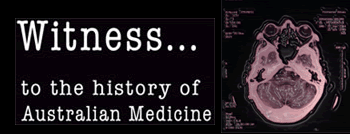


A chapter in the evolution of paediatrics in Australia
Introduction
Participants
Origins of the Department
Early developments
Leadership
New directions in patient care, research and teaching
Ethical issues in research and treatment
Formalising the research effort
Training Programs
Surgical research and training
Finding funds for research
Establishing sub-specialty departments
More on medical education
Academic outreach
Endnotes
Index
Search
Help
Contact us

Durham Smith: Is it appropriate to mention something of surgical research? Douglas Stephens was away at Great Ormond Street in the early 1950s and came back in about 1953. He was appointed first as a staff surgeon and, being full-time, he had time for research. That was then formalised after the Research Foundation was established in 1960 and he became Director of Surgical Research.
Just as John Colebatch was out on a limb in one way, as Henry [Ekert] mentioned, Douglas was also [in a similar situation]. He was not part of the University Department of Paediatrics, he was a clinical surgeon and his appointment as Director of Surgical Research was a Research Foundation appointment.[90]
Just as in other disciplines it [Doug Stephens' leadership] was immensely important. There was a stage between 1956 and 1970 when every single adult urologist in Melbourne had come through the Childrenís Hospital under Douglasí influence for short periods or long periods in paediatric surgical research. Quite remarkable.
He was intensely interested in young people, he was immensely stimulating to young surgeons and there seemed to be enough money at that time. Many of us, myself included, had up to five or six sessions a week on research salaries, being paid as an assistant or consultant, and we could confine our attention entirely to paediatric surgery. So Douglas Stephens' influence was quite profound, as a number of people trained as Paediatric Surgical Registrars over a period of years And in terms of overseas people, roughly half our surgical registrars were overseas appointments. We didnít need to train that many local paediatric surgeons and, out of four surgical registrars, almost always two came from elsewhere, from virtually any country in the world.
That continued in happy relationship through the 1960s and through the beginning of the 1970s. But then money became tighter, then the fuss occurred over the Directorship of the Foundation. Douglas Stephens found he was unable to secure as much funding proportionately as he had previously and that was reflected in a decrease in the number of young surgical trainees who came to visit. It was one of the major factors that caused him, at the end of 1974, to accept a job offer in Chicago. And he left the hospital early in 1975.
So surgical research was strong from 1956 until 1972. It then deteriorated and, after Douglas left in 1975, as I recall, no surgeon was appointed in the Research Foundation at all. That continued for a decade, until John Hutson came on the scene.[91] I think that was in the mid-1980s. So we had a decade of great hiatus in paediatric surgical research. To my shame, I was part of this and I didn't do enough, Iím sure, to encourage a more strenuous search for a research leader.
Since then, things have improved under John Hutson, apart from a local hiccup in the last few months.[92] So surgical research has never been part of the University Department of Paediatrics. It was part of the Research Foundation and proceeded from a brilliant period in the '60s, less brilliant in the '70s, non-existent in the late '70s and early '80s and now coming back again.
Peter Phelen: That's true of general surgery research. However Bill Cole was appointed a First Assistant in the Department of Paediatrics, in about 1979 or 1980.[93] He rapidly built up an outstanding research group in the Department of Paediatrics in molecular biology related to bones.
John Rogers: He was actually back earlier because he formed the Bone Research Unit in the mid 1970s.[94]
Peter Phelan: John Bateman joined soon after Bill [Cole] was appointed.[95] They were the major attractors of research money into the University Department of Paediatrics, other than David's [Danks] group.
Ruth Bishop: I just wanted to talk about John Hutson's appointment. I think Iím right about this. David [Danks] had recognised the lack of surgical research and, probably with Peter [Phelan], he had actually been budgeting for a surgeon for quite some years before John returned and it was very strong support from David and Peter that Johnís appointment was made and the salary handed over by the Research Foundation to the University Department of Paediatrics. I think itís largely been sustained in that way ever since
Peter Phelan: A third of his salary was initially paid from the University and two-thirds from the Research Foundation.
 |
Witness to the History of Australian Medicine |  |
© The University of Melbourne 2005-16
Published by eScholarship Research Centre, using the Web Academic Resource Publisher
http://witness.esrc.unimelb.edu.au/023.html